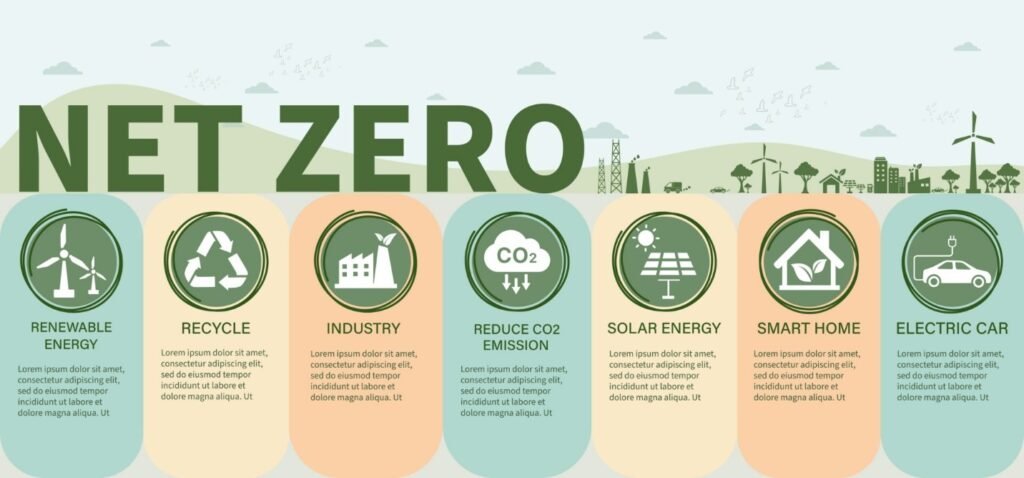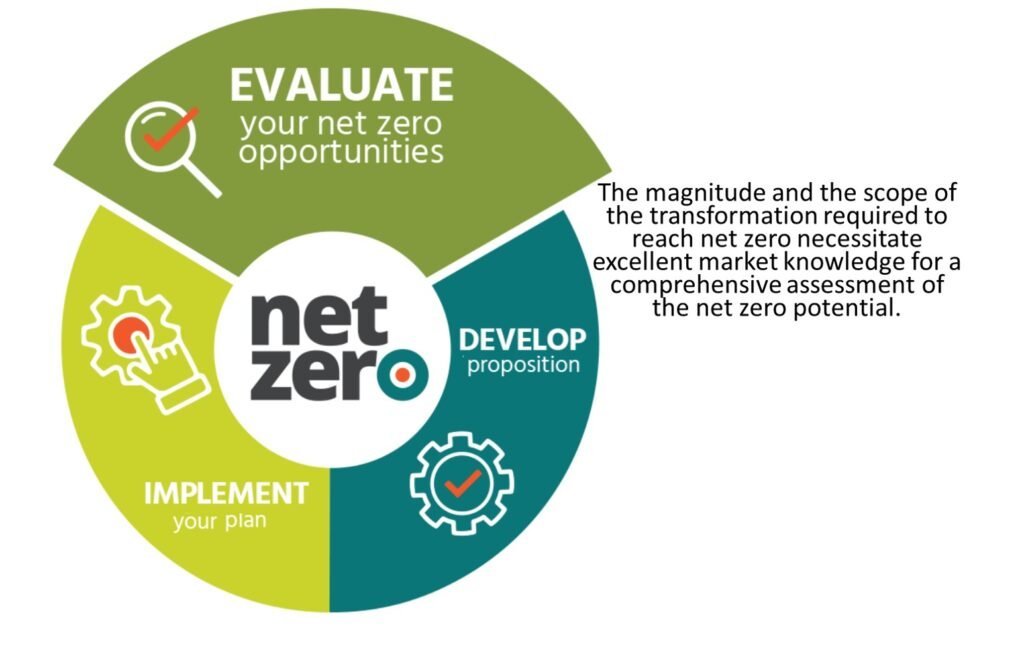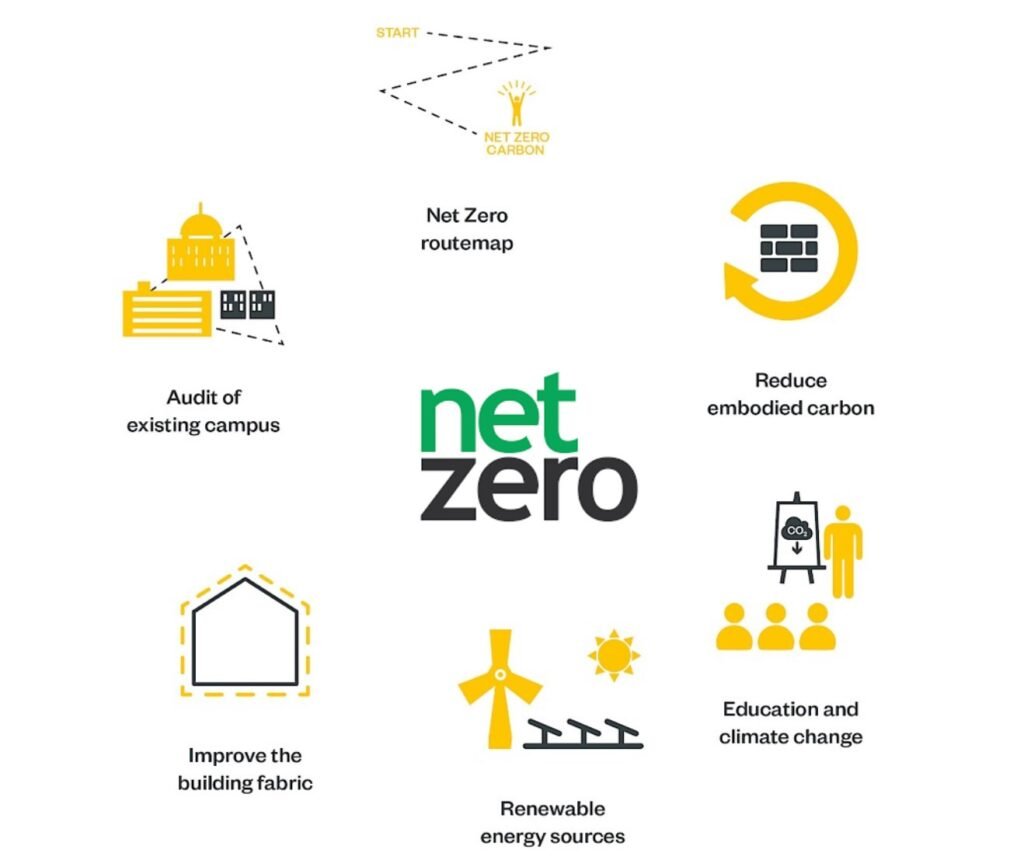NetZero – Work with Education Sector
- Home
- NetZero – Work with Education Sector
NetZero – Work with Education Sector


“Where to begin and how can you advance your responsibility to NetZero”?
The climate is evolving. So are we!!
Our goal is net-zero emissions by 2050. How is that possible? Yes, we are here to help you!!! In our pursuit of change, we’re leaving no stone unturned, questioning everything that can be questioned, and finding inspiration in surprising places.
“The paramount challenge of the 21st century has arrived. To safeguard the climate, we’re evolving in ways that may astonish you“
“CARBONOC-Climate Initiative” a roadmap and regional strategies for climate action for well-being at the heart of the transition to a green economy.
What is Net Zero & Why is Net Zero Important


Net zero, is a state in which human-caused emissions are balanced by human-caused carbon dioxide removals over a specified time period. In some contexts, “emissions” refers to emissions of all greenhouse gases, and in other contexts it refers only to emissions of carbon dioxide (CO2) Net zero is an ideal state where the amount of greenhouse gases (GHGs) released into the earth’s atmosphere is balanced by the amount of GHGs removed.
Net zero is important as it’s the best way we can tackle climate change by reducing global warming. What we do in the next decade to limit emissions will be critical to the future, which is why every country, sector, industry and each one of us must work together to find ways to cut the carbon we produce.
Our Sustainability consulting service help guide school on their sustainability journey

“Our sustainability consulting service plays a pivotal role in guiding schools on their sustainability journey. We understand the importance of integrating sustainable practices into educational institutions, not only for environmental stewardship but also for instilling values of responsibility and citizenship in students.
As per Paris Agreement under United Nation, The first instrument of its kind, the landmark agreement includes the aim to strengthen the global response to the threat of climate change by ‘holding the increase in the global average temperature to well below 2 degree Celsius above pre-industrial levels and pursuing efforts to limit the temperature increase to 1.5 degree Celsius above pre-industrial levels. Countries must achieve net zero carbon emissions by 2050.
Through our comprehensive consulting approach, we provide tailored guidance and support to schools, assisting them in developing and implementing sustainable initiatives. These initiatives encompass various aspects such as energy conservation, waste management, water efficiency, and biodiversity preservation.
Furthermore, our consulting service offers expertise in curriculum development, helping schools integrate sustainability principles across different subjects and grade levels. By incorporating sustainability into education, we aim to empower students with the knowledge and skills necessary to become environmentally conscious leaders of tomorrow.
In addition to practical guidance, we also offer ongoing support and resources to schools, ensuring that they remain committed to their sustainability goals in the long term. Our ultimate goal is to create a network of environmentally responsible schools that serve as models of sustainability within their communities.
Tailored solutions and resources for schools interested in implementing net-zero practices
Carbonoc Climate Initiatives specializes in providing tailored solutions and resources for schools that are interested in implementing net-zero practices. We recognize that each educational institution has its own unique set of challenges, resources, and goals when it comes to achieving sustainability objectives. That’s why we take a personalized approach to guide schools through the process of transitioning to net-zero operations.
First and foremost, we conduct a thorough assessment of the school’s current infrastructure, energy consumption patterns, and environmental impact. This allows us to identify opportunities for improvement and develop a customized roadmap towards achieving net-zero emissions. Our team of experts works closely with school administrators, faculty, and staff to design and implement cost-effective strategies for reducing energy consumption and increasing renewable energy generation on campus.


By offering personalized solutions and resources, we aim to support schools in becoming leaders in sustainability, inspiring future generations to prioritize environmental stewardship and contribute to a greener, more sustainable future. Throughout the implementation process, we remain committed to providing ongoing support, monitoring progress, and making adjustments as needed to ensure that schools achieve their net-zero goals efficiently and effectively.
-
Phase 1: Appraisal, Analysis and Auditing
-
Phase 2: Recommendation based on sectoral quotients and thematic deployment in the campus and neighborhoods
-
Phase 3: Implementation phase according to the path to net zero will be included.
-
Phase 4: Interaction phase- Receives inputs and exchanges local specification
-
Phase 5: Documentation & Submission for Regulatory body

Benefits of adopting net-zero initiatives for educational institutions
By reducing or offsetting their carbon emissions, schools contribute to mitigating climate change and protecting the environment. This demonstrates a commitment to sustainability and fosters a culture of environmental stewardship among students, staff, and the broader community.
Implementing net-zero initiatives provides valuable hands-on learning opportunities for students across various subjects, including science, technology, engineering, and mathematics (STEM). Students can engage in real-world projects related to renewable energy, energy efficiency, and environmental conservation, enhancing their academic experience and preparing them for future careers in sustainability.
Transitioning to net-zero operations often leads to significant cost savings over time. By investing in energy-efficient technologies, renewable energy sources, and waste reduction strategies, schools can lower utility bills and operating expenses, freeing up resources for other educational priorities.
Net-zero buildings are designed with a focus on occupant comfort, indoor air quality, and natural lighting, which can positively impact the health and well-being of students and staff. Improved indoor environments contribute to better concentration, productivity, and overall satisfaction among building occupants.
Adopting net-zero initiatives can strengthen ties with the local community and demonstrate leadership in sustainability. Schools can collaborate with community partners, such as local governments, businesses, and nonprofit organizations, to share best practices, leverage resources, and promote environmental awareness and action.
As climate change impacts become more pronounced, net-zero buildings are better equipped to withstand extreme weather events and disruptions to energy supply. By investing in resilient infrastructure and adaptive strategies, schools can enhance their preparedness and ensure continuity of operations in the face of environmental challenges.
Embracing net-zero initiatives enhances the reputation and branding of educational institutions as forward-thinking, socially responsible organizations. This can attract students, faculty, and donors who are aligned with the school’s values and priorities, ultimately contributing to its long-term success and competitiveness.

